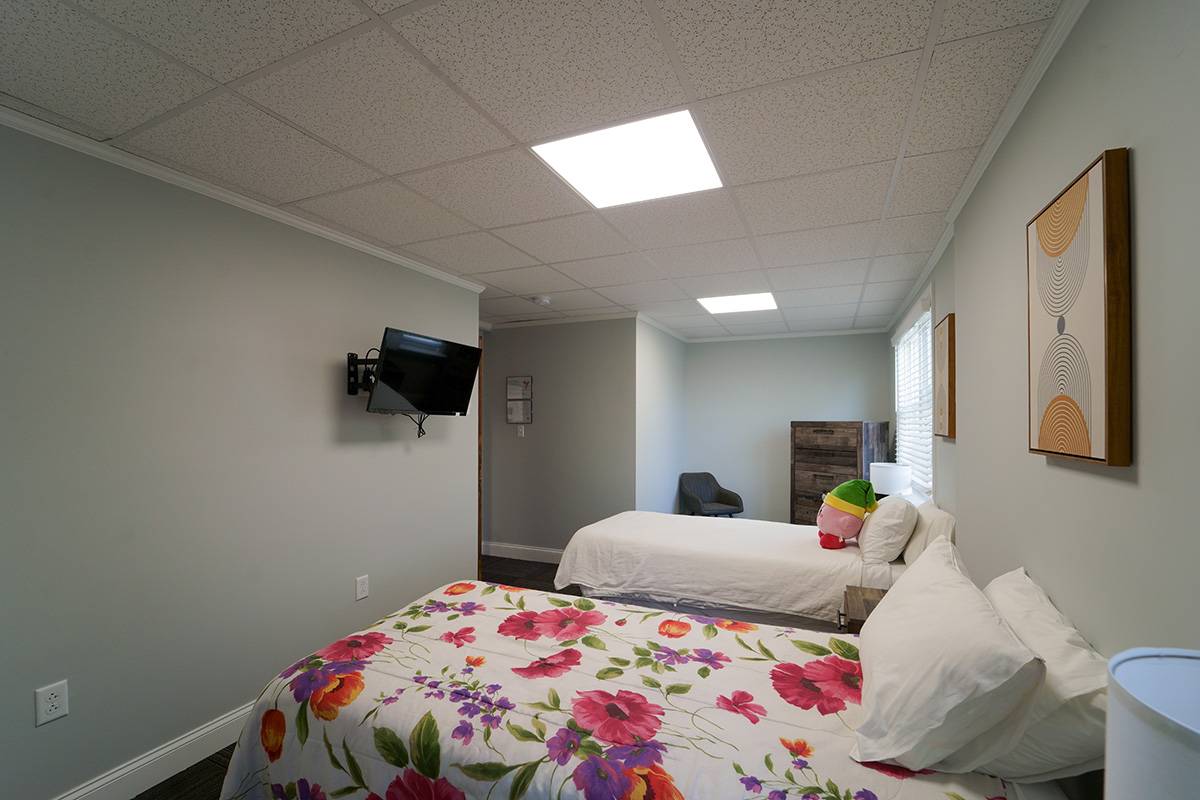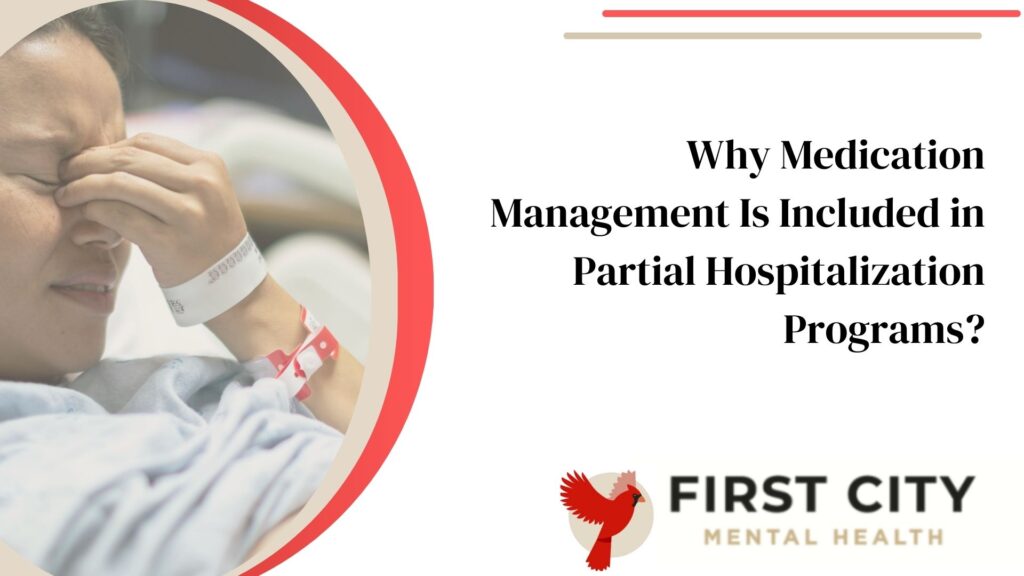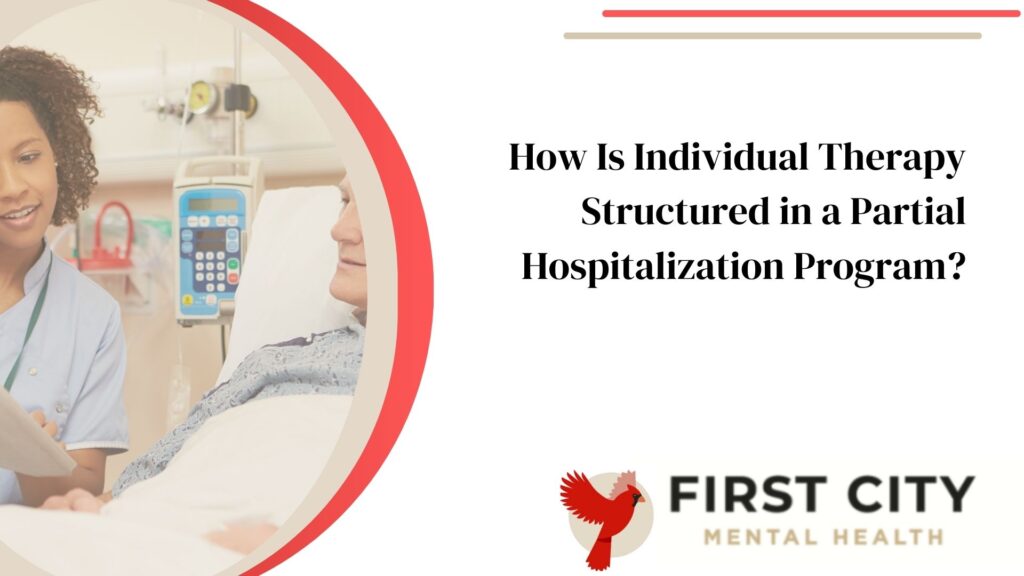
Why a Partial Hospitalization Program Might Be Right for You?
January 27, 2025
What to Expect from a Mental Health Residential Treatment in Kokomo?
January 28, 2025Dealing with mental health concerns can be overwhelming, especially when you’re trying to figure out the best type of care for your situation. Many people find themselves stuck between inpatient hospitalization and regular outpatient therapy.
This middle ground is where a partial hospitalization program (PHP)shines, providing structured support without requiring an overnight stay.
A mental health partial hospitalization program offers intensive treatment, typically lasting 30-45 days. During this time, patients participate in various therapies and activities designed to stabilize their mental health and help them reintegrate into daily life.
Our blog will guide you through the specific services offered in PHP and how they can benefit you during your recovery journey.
Want to learn more? Keep reading!
Key Takeaways
- Partial hospitalization programs (PHPs) provide structured, intensive care for mental health patients without requiring overnight stays.
- PHPs offer a range of therapies, including group therapy, individual therapy, and life skills reintegration, to help stabilize mental health.
- Medication management in PHPs ensures that patients receive the proper medications and adjustments as needed by professionals.
What Types of Therapy Are Provided in a Partial Hospitalization Program?
Partial Hospitalization Kokomo Programs offer various therapies to support mental health, aiming to meet patients’ diverse needs.
- Group Therapy
- Group therapy sessions provide a supportive environment where individuals can share experiences and learn from others. They help build social skills and coping strategies.
- Individual Therapy
- One-on-one sessions with a therapist allow for personalized care. Therapists work with patients on specific issues, helping them develop tailored coping mechanisms.
- Medication Management
- Medication management involves regular consultations with psychiatrists or medical professionals to monitor and adjust medications as needed. This ensures that treatment aligns with the patient’s evolving needs.
- Life Skills Reintegration
- This includes training in independent living skills such as cooking, budgeting, and time management. These skills are crucial for daily functioning and long-term recovery.
- Dialectical Behavioral Therapy (D.B.T.)
- D.B.T. focuses on teaching patients to manage emotions more effectively and improve interpersonal relationships through mindfulness and distress tolerance techniques.
These therapies collectively aim to provide a well-rounded mental health treatment experience tailored to individual needs while ensuring comprehensive care on each treatment day without needing overnight stays, excluding holidays.
Why Medication Management Is Included in Partial Hospitalization Programs?

Mental health Partial hospitalization programs (PHP) offer various therapeutic services to support mental health. Medication management is crucial in these programs to ensure patients receive the necessary care.
It helps stabilize patients’ mental health, allowing them to benefit more effectively from other treatments like therapy and life skills reintegration.
Medication management is essential because PHP provides more care than outpatient services. This ensures that adult patients can manage their daily activities without feeling overwhelmed by their symptoms.
Including medication management supports individuals’ return to work or school, aiding in their integration back into society with better control over their mental illness.
Medication management is pivotal for stabilizing patients and enabling them to thrive.
When Are Group Therapy Sessions Scheduled in a Partial Hospitalization Program?
Group therapy sessions in a Partial Hospitalization Program mental health (PHP) are scheduled for 6-8 hours of daily therapeutic programming. Patients who have completed residential programs and are transitioning back to society often find these sessions crucial for their mental health stabilization.
These group meetings occur consistently throughout the week, allowing participants to build a predictable routine.
The structured environment helps in achieving treatment goals effectively. Scheduling might vary between treatment centers, but most offer group therapy multiple days per week within regular business hours.
This setup supports patients’ comprehensive care needs alongside individual therapy and medication management.
Where Are Recreational Activities Conducted in a Partial Hospitalization Program?
Recreational activities in a partial hospitalization program (PHP) often take place off-site in community sober housing environments. This approach promotes the development of independent living skills, which is crucial for those transitioning back to everyday life.
Facilities like First City Mental Health ensure these activities integrate seamlessly with therapeutic goals.
These environments provide a supportive setting where individuals can practice new skills and enjoy social interactions. The aim is to foster confidence and prepare participants for successful reintegration into their communities while maintaining sobriety and mental health stability.
How Is Individual Therapy Structured in a Partial Hospitalization Program?

Patients in the Indiana Partial Hospitalization Program (PHP) participate in individual therapy sessions multiple times a week to help stabilize their mental health. Each session is designed to address specific issues and goals, which are established during the initial assessment.
Therapists use evidence-based techniques tailored to each patient’s needs, focusing on cognitive-behavioral therapy (C.B.T.), dialectical behavior therapy (D.B.T.), and solution-focused brief therapy.
This intensive care aims at providing skills that enable individuals to manage symptoms effectively as they transition back into daily life.
These sessions typically last 45-60 minutes and occur in private settings within the facility. A licensed mental health professional conducts them, maintaining confidentiality while building trust with the patient.
These individualized plans aim to support patients in achieving greater independence and stability, preparing them for less intensive levels of care after completing the PHP program.
Why Is Family Therapy Part of Partial Hospitalization Programs?
Individual therapy focuses on the patient’s personal growth and coping skills. Family therapy, however, plays a crucial role in partial hospitalization programs (PHP), particularly for mental health stabilization.
It aids in reintegrating the patient into society after completing more intensive treatments like a residential program.
Family therapy aims to help individuals function independently within their family settings. This intensive treatment component strengthens family relationships by improving communication and understanding among members.
Individuals can stabilize their mental health more effectively with robust family support systems, making it easier to transition back into daily life after leaving an Indiana partial hospitalization program.
Why Are Holistic Services Important in Partial Hospitalization Programs?
Holistic services are crucial in adult Partial Hospitalization Program (PHP) because they offer a comprehensive approach to mental health care. These programs provide higher levels of care than outpatient services, aiming to stabilize patients so they can return to independent living.
Addressing every aspect of a patient’s well-being ensures that their mental health needs are met thoroughly.
Incorporating individual therapy, group therapy, medication management, and life skills reintegration into PHP allows patients to experience balanced treatment. By doing so, the program addresses the symptoms and helps improve overall quality of life and personal functioning.
This holistic approach makes adult partial hospitalization programs practical for those needing intensive support without staying overnight.
Why Are Social Skills Training Included in Partial Hospitalization Programs?

Social skills training plays a crucial role in partial hospitalization program in Indiana because it helps stabilize individuals’ mental health, allowing them to return to work or school. These programs enhance communication abilities, problem-solving skills, and emotional regulation.
Beneficiaries learn how to navigate social situations without feeling overwhelmed by their mental illness.
Practicing these skills prepares patients to manage daily activities independently. Social interactions can be daunting for those struggling with mental health issues. Training boosts confidence and equips individuals with the tools to reintegrate into society successfully.
For instance, people attending a partial hospitalization program (PHP) in Indiana will find these sessions instrumental in their recovery journey.
Conclusion
A Mental Health Partial Hospitalization Program (PHP) offers structured, intensive care. Patients receive both group and individual therapy sessions daily, and medication management ensures proper treatment plan adherence.
Recreational activities keep participants engaged and active. Holistic services cater to overall well-being, while family therapy strengthens support systems at home. PHP blends these elements seamlessly to stabilize mental health effectively.
F.A.Q.s
What is a partial hospitalization program for mental health?
A partial hospitalization program (PHP) for mental health provides intensive treatment without requiring an overnight stay.
Who makes up the treatment team in a PHP?
The treatment team usually includes doctors, therapists, and nurses who work together to provide care.
How do you start the referral process?
To refer patients to a partial hospitalization program in Indiana, contact your doctor or insurance company to begin the referral process.
Will my insurance cover the costs of PHP?
Insurance coverage varies; check with your insurer about out-of-pocket costs and if Medicare covers it.
Can children attend school while in a PHP?
Yes, many programs allow children to attend school during their time in the partial hospitalization program.






